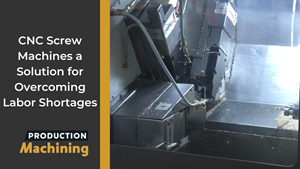Department of Energy Selects the University of Texas – San Antonio to Lead Cybersecurity Manufacturing Innovation Institute
The institute is a public-private consortium to bolster U.S. manufacturing competitiveness, energy efficiency and innovation.
The U.S. Department of Energy (DOE) selected the University of Texas – San Antonio to lead the Cybersecurity Manufacturing Innovation Institute (CyManII), a public-private consortium to bolster U.S. manufacturing competitiveness, energy efficiency and innovation. CyManII will focus on early-stage research and development (R&D) to advance cybersecurity in energy-efficient manufacturing.

“As the sector-specific agency for cybersecurity in the energy sector, the DOE is committed to working with our public and private partners to mitigate cyber risks across the energy sector, including in advanced manufacturing,” says Under Secretary of Energy Mark W. Menezes. “Through the CyManII, DOE will leverage the capabilities of the Idaho, Oak Ridge and Sandia National Laboratories across the applied energy, science and national security mission space to develop innovative cybersecurity technologies and strategies to minimize risk and accelerate energy efficiency across manufacturing supply chains. This institute will help ensure America’s manufacturing base remains secure, resilient and globally competitive.”
Securing the critical infrastructure in the U.S. from cyber attacks is one the most important challenges we face as a nation, according to the DOE. In 2018, the Trump Administration released the National Cyber Strategy to protect the nation’s critical infrastructure (including energy) from cyber espionage and attacks, and the Strategy for American Leadership in Advanced Manufacturing prioritized the development of new technologies to help make U.S. manufacturing more cyber secure. Advanced manufacturing in the U.S. is improving energy efficiency through new sensor and control technologies, but also has the potential to introduce cyber vulnerabilities. The purpose of CyManII is to address those cyber vulnerabilities to secure America’s manufacturing sector.
“Advanced manufacturing technologies, including novel industrial control systems, hold promise to improve the energy efficiency and competitiveness of the U.S. manufacturing sector,” says Daniel R Simmons, assistant secretary for the Office of Energy Efficiency and Renewable Energy. “The Cybersecurity Manufacturing Innovation Institute will address a range of cybersecurity challenges to enable the increased adoption of next-generation, energy-efficient technologies in American manufacturing.”
CyManII will lead a national consortium with partners from industry, universities and three DOE National Laboratories. The consortium will focus on making U.S. manufacturing more energy efficient and cyber secure by addressing two key manufacturing challenges: securing automation and securing supply chain networks. Through cutting-edge R&D, CyManII will develop an enhanced understanding of evolving cybersecurity threats to manufacturing, develop new cybersecurity technologies and methods, and share information and knowledge with U.S. manufacturers. The institute will also address the need for education, training and workforce development in advanced manufacturing and cybersecurity.
“Our electricity and oil and natural gas partners across the energy sector provide the services that underpin the national defense, vital emergency services, critical infrastructure, economy and way of life for the American people,” says Alexander Gates, DOE’s senior advisor for cybersecurity. “This institute will rebuild the United States’ position as a global leader in clean manufacturing at a time when foreign adversaries continue to threaten the security of our country.”
CyManII is funded by the Office of Energy Efficiency and Renewable Energy’s Advanced Manufacturing Office (AMO) and co-managed with the Office of Cybersecurity, Energy Security, and Emergency Response (CESER). The institute will leverage up to $70 million over five years in federal funding, subject to appropriations, and will be matched by over $40 million in private cost-share commitments. The sixth institute funded by AMO, CyManll will be a part of Manufacturing USA, a network of federally funded institutes dedicated to improving U.S. manufacturing competitiveness and promoting a robust and sustainable national manufacturing R&D infrastructure.
Related Content
The Value of Aligning Efforts to Promote Manufacturing Careers
Successfully building the next generation of manufacturers requires a team effort between employers, educators and parents. Each of these three groups has a tremendous impact on young people’s career decisions. Without the support of all three, we are unlikely to bridge the skilled labor shortage that threatens the future growth of our industry.
Read MoreStrengthening Manufacturing Workplaces Through Active Listening
A good strategy to weather the storms of manufacturing market upheavals and unpredictable factors is to commit to continuous, active employee listening.
Read MoreVideo Tech Brief: CNC Screw Machines a Solution for Overcoming Labor Shortages
CNC screw machines can exceed job shop productivity and enable manufacturers to overcome perpetual employment gaps.
Read MoreRecognizing Signs of a Degrading Workplace Culture
Is your machine shop missing key “culture elements?” Here are ways to identify if your organization is heading in the right or wrong direction in terms of establishing a healthy company culture.
Read MoreRead Next
Seeing Automated Workpiece Measurement in Real Time
User-friendly inspection software for CNC machining centers was shown at IMTS 2024 monitoring measurements between and after machining while performing SPC based on recorded measurement values.
Read More5 Aspects of PMTS I Appreciate
The three-day edition of the 2025 Precision Machining Technology Show kicks off at the start of April. I’ll be there, and here are some reasons why.
Read MoreA Tooling Workshop Worth a Visit
Marubeni Citizen-Cincom’s tooling and accessory workshop offers a chance to learn more about ancillary devices that can boost machining efficiency and capability.
Read More














.jpg;maxWidth=300;quality=90)








